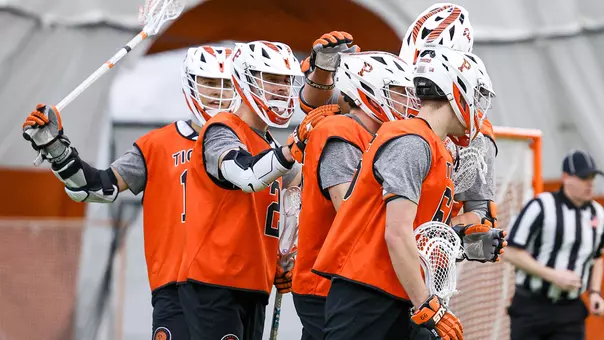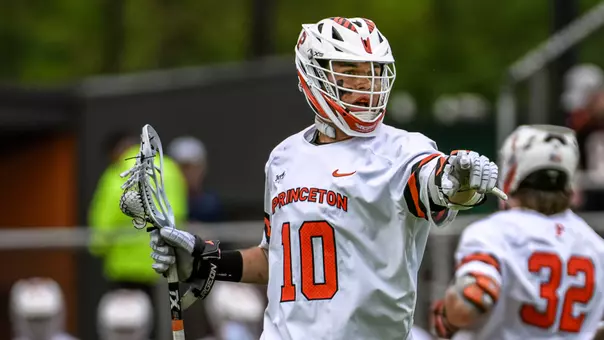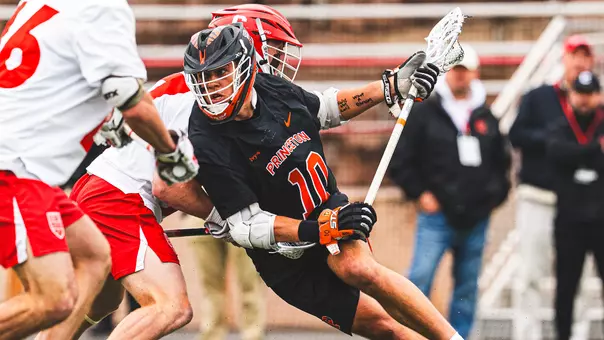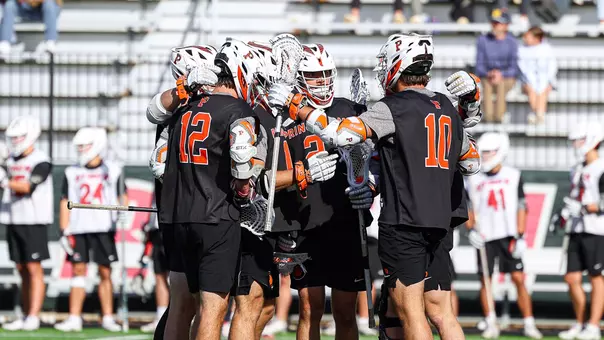Princeton University Athletics
Princeton-Syracuse 1992 Title Game Named Men's Lacrosse Game Of The Decade
April 06, 2000 | Men's Lacrosse
April 6, 2000
He came to a lacrosse ghost town and dared to dream big. Come with me, he told them, because together we're going to the top. Some signed on, chuckling at the thought of what he was saying.
They were his boys, and they began to believe in the message and the messenger. And he took them, starting at the very bottom, until one morning in 1992 Bill Tierney and his Tigers stood on the verge.
"I knew," says Roy Simmons Jr., the Hall of Fame former Syracuse coach, "that there was magic there that day."
That day was Memorial Day 1992, the greatest day in the history of Princeton lacrosse and one of the greatest days in Princeton athletic history.
Princeton's men's lacrosse team had more than its share of great games in the 1990s. The Tigers won five national championships and seven Ivy League championships in the decade. They played 23 NCAA tournament games in the decade, and 14 of those were decided by two goals or fewer.
Princeton was 12-2 in those 14 games. There were countless great regular season games, most notably the 15-14 win in four overtimes at Syracuse last year. Still, Memorial Day 1992 outdid them all. Princeton 10, Syracuse 9, two overtimes, for Princeton's first NCAA championship. Everything that followed began that day.
It is the Princeton Athletic News men's lacrosse Game of the Decade.
"I'll never forget my recruiting visit to Princeton," says Greg Waller, then an All-America mid-fielder and today the vice president of a local construction company. "Coach Tierney told my dad that he could guarantee that if I came to Princeton, I'd play for a national championship. My dad said, `that guy's crazy.' "
Maybe crazy. Maybe just a dreamer. Or maybe he knew something no one else knew, that he could win at Princeton.
Not that it would be easy. Princeton was 12-46 in the four years prior to Tierney's arrival, and his first team, in 1988, went 2-13. His first recruiting class, the Class of '92, arrived the following fall.
"We had our first team meeting, and Coach Tierney kept the freshmen around when it was over," says Mike Mariano, a first-team All-America defense-man in 1992. "He looked at us, and he said `whether you know it or not, you guys are the ones who are going to win the national championship.' We were like, `sure, whatever.' "
The 1989 season saw Princeton improve to 6-8, and the Tigers broke though in 1990, reaching the NCAA tournament for the first time ever and defeating Johns Hopkins before losing to Yale in the quarterfinals. The 1991 season ended in heartbreaking style, as the Tigers lost 14-13 to Towson State in the quarterfinals in three overtimes. Still, 2-13 had became 12-3, and now that Class of 1992--led by Waller, Mariano, attackman Justin Tortolani, defenseman David Gaines and midfielder Andy Moe--had added three more recruiting classes, which included All-Americas like goalie Scott Bacigalupo, defenseman David Morrow, midfielder Scott Reinhardt and attackman Kevin Lowe. The Tigers were primed for a big-time run.
Princeton opened its 1992 season with a 15-14 loss to Johns Hopkins, and the Tigers stood at 3-2 after a 9-8 loss to North Carolina. Princeton then cruised through the Ivy League season to win its first title since 1967, and Tortolani's four goals, including the game-winner, gave Princeton an 11-10 win over Maryland in the quarterfinals and a berth in the Final Four. Joining Princeton in Philadelphia would be Johns Hopkins, North Carolina and Syracuse, who between them had won the previous 13 national titles.
"To a man, we were not just happy to be there," says Mariano, who now works in finance at Chase. "Certainly we were ecstatic to be in the Final Four, but we knew we could beat anyone when we played our game."
The semifinal against North Carolina was played on a day when the temperature on the carpet at Franklin Field was well over 100 degrees. The normally deliberate Tigers did something in that game that they had never done before under Tierney and have only done once since--they gave up at least 14 goals and still won. Princeton trailed only once, at 1-0, but the Tigers had to snap a 14-14 tie with a goal from Mal Meistrell with 3:18 to play and then the clincher from Tortolani with 1:49 remaining for a 16-14 win and a berth in the final.
Waiting there would be Syracuse, the giant among giants in the sport. If Princeton was going to get its first title, it would have to earn it.
"It was really hard to envision how low they were when Bill got there and how hard it was to climb out of it," says Simmons, whose six NCAA titles are the most by any coach. "To win, you have to get good talent, and Bill didn't really have much to sell at first. They had a great tradition, but they had had some soft years there. What he had to endure the first couple of years must have been tough for him. But Bill knew what to do. He has a great lacrosse mind, and he's such a fierce competitor. It was only a matter of time."
There was one day off between the semifinals and final, for which the temperature dropped about 50 degrees.
"I spent a little time with Bill that Sunday," Simmons says. "We both won Saturday, so we had to go to the coaches' meeting Sunday. After the meeting, we left the athletic center together and went for a little walk. We wished each other well, which neither one of us probably meant, of course. I remember thinking how this was new for him, and I think he was a little nervous. But I also remember thinking about how much faith he had in his boys and how much faith they had in him. That's when I knew that there was going to be very little stopping them Monday."
Syracuse had won national championships in 1988, 1989 and 1990, and the Orangemen certainly carried a mystique about them.
"I think for about the first three minutes, we saw their jerseys and their helmets and might have been a little nervous," Mariano says. "After that, after they had their first settled offensive series and we clamped down on them, I think we knew that we were gong to be in it for the game."
Princeton shocked Syracuse, scoring the first six goals of the game and building a 7-2 edge at halftime.
It was strange," says Waller, perhaps the best face-off man in school history. "We got up so quickly on them. And then, we let them slip back in it."
Princeton led 8-2 with three minutes remaining in the third quarter, but Syracuse mounted its inevitable charge. A pair of goals before the end of the third quarter made it 8-4, and a huge momentum swing occurred when Tortolani was flagged for a one-minute, non-releasable penalty for an illegal stick to start the fourth quarter. Syracuse scored once on the penalty and once as soon as it expired, and it was 8-6 barely a minute into the fourth quarter. Less than a minute later, it was 8-7, it was 8-8 when Dom Fin scored with 8:24 to play in the fourth.
"After they tied it, there was a timeout," Mariano says. "We were starting to look at each other, and guys were yelling `what's going on?' We gathered everybody together, and I remember saying `listen, if I had told you Friday night that we'd be tied late in the fourth quarter of the championship game, you'd each have said that we're going to win it.' I think we figured that if we settled down and got back to our game, we'd be fine."
Things looked better than fine for Princeton when Waller scored with 2:37 on a move from behind the net, and the celebration was almost starting when Syracuse was flagged for a holding penalty with 1:30 to play. Princeton didn't score, but the ball was in the Syracuse end as the clock headed under one minute. Orangemen goalie Chris Surran finally picked up the ball and flung it the length of the field, where it looked like Bacigalupo--who would be a three-time national goalie of the year and the Most Outstanding Player of the two NCAA championships, including this one--had an easy play on it. Instead, the ball squirted off the turf, took a crazy hop through the goalie's stick and landed in the stick of All-America attackman Tom Marechek.
"They threw it all the way down," says Mariano. "I think Scott tried to one-time it back the other way, but it got past him. Marechek had it, and I was the only thing between him and the goal. I couldn't decide whether to run to the goal or just tackle him, but he scored before I could do much of anything."
The shocking goal made it 9-9 with 42 seconds to go. Tortolani hit the pipe with about 10 seconds to go, but the teams headed into sudden death overtime.
Syracuse won the face-off, and the Orange set a play for Fin.
"He was an All-America," Simmons says. "We ran a play perfectly for him, and he was wide open in front of Bacigalupo. All he had to do was throw it in the goal. Instead, he threw it so fast that Bacigalupo didn't have time to move on it. It ended up hitting him in the head. I had our new chancellor, who had never seen a lacrosse game before, and our athletic director standing next to me on the field at the time, just to add to it."
Bacigalupo's save on Fin was one of 15 on the day and three in the first overtime for the Tiger All-America. Syracuse controlled the ball for the first 2:30 of the overtime, but Princeton was able to get control after that. The Tigers had it for the final 1:30, and their best chance came from Lowe. Surran stopped that chance, and it was to a second overtime.
"I won the face-off, and I pushed the ball to the side," Waller says. "I went to pick it up, but Moe had already gotten it. I just trailed the play."
"I thought, `good, now we'll at least get a shot,' " Mariano says. "Then he just kept running. Once he got going, their attackmen were already hanging their heads. I thought `he's going to shoot it.' When he scored, it took a little while to sink in. It was amazing, but I don't think any of us were surprised. To be honest, I think we could have really pasted them that day."
Moe's goal came nine seconds into the second overtime and gave Princeton the title. Legend has it that when Moe came back to Princeton, he threw all of his lacrosse equipment off the bridge on Washington Road into Lake Carnegie.
"I thought that that game might have been the first of many," Waller says. "I don't think anyone would foresee that we would win five in seven years, but we knew that we weren't a fluke. What's really special to me now is that we were able to take a team that won two games the year before we got there to a national championship. We were, and are, very proud of that." They did it in dramatic fashion on a cool day in 1992. It was the beginning of a dynasty to come, but it was so much more than that.
In the beginning, they were told that what seemed nearly impossible was going to come true. In the end they made it happen together.
They were a group of guys who started together with nothing, at the very bottom of their sport. Led by their dreamer coach and an unshakable faith in each other, they left together on top. Roy Simmons Jr. was right. There was magic there.
by Jerry Price













